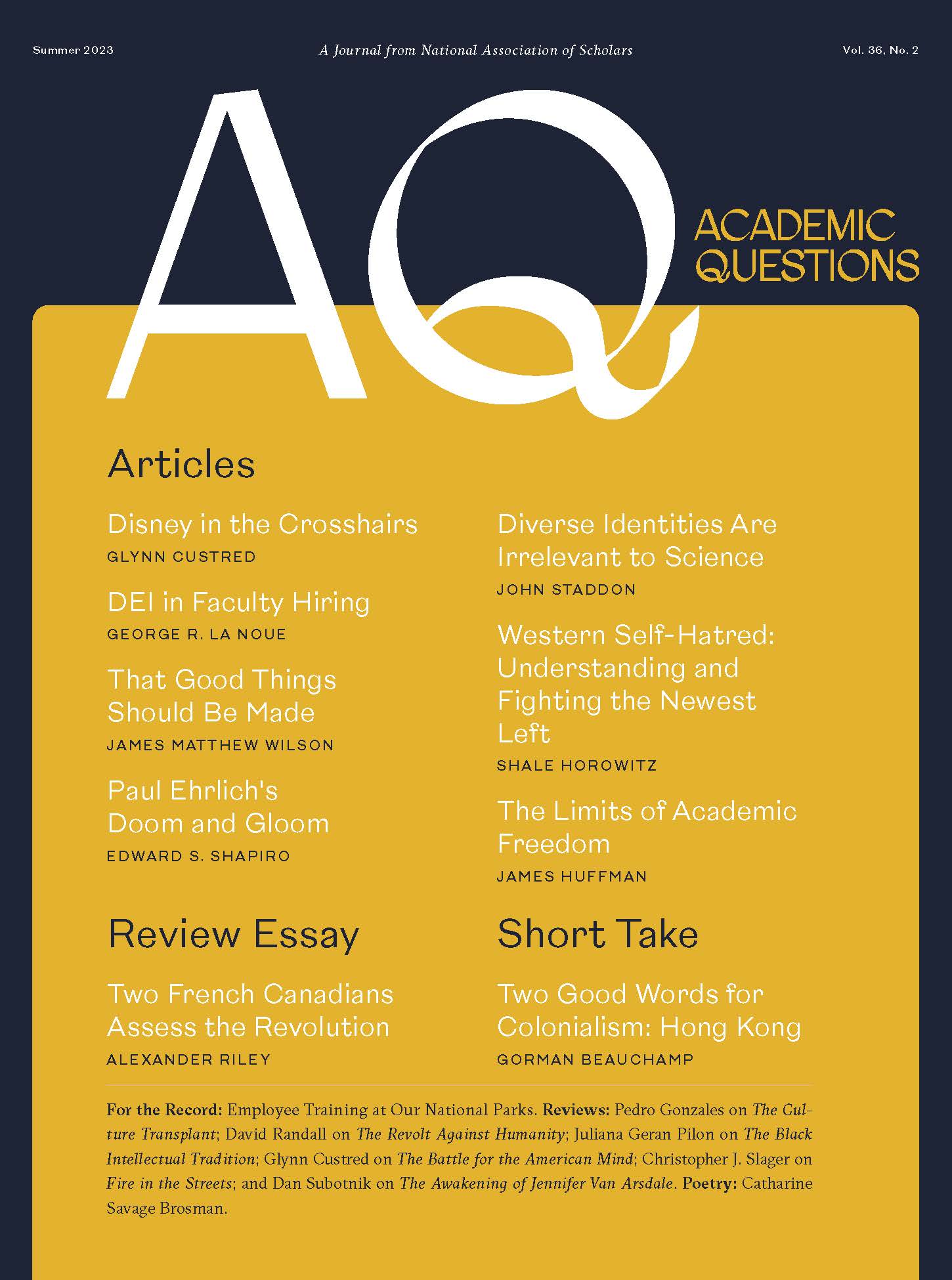Fire in the Streets: How You Can Confidently Respond to Incendiary Cultural Topics, Douglas R. Groothuis, Salem Books, 2022, pp. 256, $22.49 hardcover.
Ideology is existence in rebellion against God and man.
Eric Voegelin
Whether we speak of Marxism, Communism, Critical Theory, or Critical Race Theory, each is an ideological perspective that rejects the Logos and imagines its neighbor to be the efficient cause of all that is, was, and shall be wrong with our world. From this sordid frame of reference comes a wasting fever of the heart that seeks to stoke the fires of hate and strife on city streets across our American nation. In such moments, we are apt to feel ourselves exiled from a “world of reason, and order, and peace, and virtue, and fruitful penitence, into the antagonistic world of madness, discord, vice, confusion, and unavailing sorrow.”1 Yet we must not despair and surrender the field to rebellious antagonists. For as long as there are protagonists capable of countering ugliness with Truth, Beauty, and Goodness, then, in time, our present adversaries may prove to have been little more than the flies of a summer.2
Douglas R. Groothuis, author of Fire in the Streets: How You Can Confidently Respond to Incendiary Cultural Topics, and Professor of Philosophy at Denver Seminary, is one such protagonist.
Fire in the Streets is a purposeful response to the condemnations levelled at America and Western civilization by the quasi-prophets of Critical Race Theory. Groothuis’s critique of CRT is not a pedantic academic endeavor, nor is Groothuis an apologist for a political party. Instead, his approach is that of a Christian and citizen-philosopher whose political inclinations were formed by classical liberalism in the tradition of Edmund Burke (1729-1797), Russell Kirk (1918-1994), and Thomas Sowell (b. 1930).
The specter of Critical Race Theory did not appear out of thin air. The theory is instead the latest strain of a progressively nuanced intellectual movement, nurtured with a lust for revolution. Groothuis provides a lucid and important account of the transitions within an ideology that fueled Marxism and Communism before its adaptation to Critical Theory and Critical Race Theory.
Taking Karl Marx as a starting point, Groothuis identifies several Marxist fundamentals that are headlined by Marx’s antipathy toward religion. “Marx,” Groothuis writes, “fashioned himself a demonic figure, a Mephistopheles who cursed Heaven in the name of autonomous and rebellious man . . . Marx’s ruling passion was political revolution.” (5) My understanding is that Fyodor Dostoevsky is accredited with the axiom, “Without God all things are permitted.” That axiom could have been a motivational poster on Marx’s bedroom wall. For Marx’s atheism, conjoined with his libido dominandi3 (dominating lust) for political revolution, set the tone for the mercilessness of communism in the twentieth century. Marx focused on class resentment, but later agitators would shift the locus of conflict.
In 1923, Erich Fromm, Max Horkheimer, Walter Benjamin, Theodor Adorno, and Herbert Marcuse founded the Frankfurt School out of the Institute for Social Research in Frankfurt am Main, Germany. Later, in 1937, the Frankfurt School found shelter in the United States where its founders coined a new term, “Critical Theory,” as a foil for the Marxist ideology that brought trouble to those men while in Germany. (11) “Those in the Frankfurt School, atheists to a man, extended their critique of oppression beyond economic categories . . . to include cultural factors related to race, gender, and sexuality,” Groothuis writes. (11) In consequence, the labor of the Frankfurt School would midwife the birth of modern identity politics.
Then comes the onset of Critical Race Theory with the obdurate presupposition of Derrick Bell. Groothuis writes of Bell, “He claimed that American law remained racist . . . and white people only agree to help black people when it helps them. The assessment of law and politics must shift away from objective concerns based on empirical evidence to black people’s ‘lived experience.’” (14-15) Worse still, Bell professed the belief that racism is a permanent feature of American life and of its white citizens. While Bell’s view of white Americans as permanently racist is itself racist, it has not prevented his views from being embraced and expanded on by a new chorus of CRT believers.
Ibram X. Kendi, Robin Di Angelo, and Kimberlé Crenshaw are some of CRT’s chief prophets. Each of these individuals ridicule America as “systemically racist,” and polarize the public with ludicrous and broad-brush slogans such as “all white people are racist.” (64) Any white person who dares to deny his or her alleged inner racist is instantly caught in a catch-22 for the explicit denial only “proves that they are covering it up.” (64) Consequently, CRT exposes itself as an ideological conduit through which revolutionary ideologues pose as angels of light, uniquely equipped to excoriate and institute penance upon America for its “original sins” of racism and slavery. Penance, however, comes through a rigid and unforgiving program of abasement that Kendi calls “antiracism.” (61-62) All the while, these radicals flout their own hubris. As Groothuis points out, “The ideologue is certain that she is correct, so she need not reevaluate her basic perspective” (91) Groothuis finds a kindred connection with Russell Kirk, who pronounced this of revolutionary ideologues a decade before his death:
A revolutionary . . . always is right: just conceivably he may be over-zealous on occasion, but the purity of his motives is beyond question. The ideologues are Burckhardt’s “terrible simplifiers.” They reduce politics to catch-phrases; and because they will tolerate no stopping-place short of heaven upon earth, they deliver us up to men possessed by devils.4
One example of Kirk’s typical revolutionary—thinking oneself right, even when wrong—is found in the person of Nikole Hannah-Jones. Hannah-Jones’s claim to infamy is located in her contribution to the 1619 Project for New York Times Magazine. The claim she forwards is that the year 1619—not 1776—was the actual founding of America, for 1619 was the ontological year when a ship of indentured black people arrived on American shores. And what was the American Revolution about? That was simply a war to defend and safeguard slavery in America. (47) Of the 1619 Project’s proposition, Groothuis concludes, “The 1619 thesis is revisionist history at best and propaganda at worst.” (47) Groothuis devotes an entire chapter to challenging this reductionist view of America, titled “What Is America, and Should We Burn It?”
Groothuis asserts that CRT’s “principles are incompatible with the founding principles and ideals of America.” (41) The CRT ethos is demonstrably one without faith, hope, and charity and these virtues still hold sway over the hearts and minds of many Americans today. America had, has, and will continue to have its share of flaws. But it is a place where principle and a generally Christian conscience coalesce into what Groothuis calls the American creed. (42-46) “This creed,” Groothuis argues, “is shaped by our founding documents—the Declaration of Independence and the Constitution—as well as by salient aspects of [American] history.” (43)
Groothuis identifies and defends the high ideals of human equality, natural and unalienable rights, and the institution of just government among men set forth in the Declaration and the Constitution. Even the Constitution’s often misunderstood three-fifths clause (Article I, Section 2) was an effort to curtail the power of slave states. “God Bless America,” in other words, is a more appropriate invocation than is Jeremiah Wright’s “God Damn America.”
Nevertheless, CRT’s prophets of grievance and revolution leverage past woes in pursuit of their own objectives, a claim that is demonstrated throughout Section III, “Most Combustible Topics,” in which Groothuis explores issues such as racial disparities and affirmative action, the criticism and cancellation of free speech, race and economics, race and reparations, along with race and human identity. His arguments are well researched and drawn from a substantial array of sources, and have mostly been heard before. But as CRT propels American and Judeo-Christian ideals into bathos, a reader should keep George Orwell in mind. “We have now sunk to a depth at which re-statement of the obvious is the first duty of intelligent men.”
Groothuis’s voice has an important part to play in the collective response to the low and recycled hatred on offer from CRT. He confidently and competently confronts the logical contradictions and the dishonest account of American history given by ideologues who know how to destroy but not to sustain the reasonably just and tolerable civilization that is America.
Critical Race theorists are masters of rhetoric and sophistry. Under CRT, rhetoric and sophisticated-sounding argumentation become dangerous twins whose siren song of ideology lures a significant number of well-meaning, yet gullible and undiscerning souls, to the rocks of shipwreck. To stymie that end, Groothuis challenges his readers to fight bad fire with good fire. (196)
To that purpose, Groothuis writes, “Some who may seem to be enemies can be disarmed and thoughtfully engaged through respect and love.” (178) This is because human identity is anchored to humanity’s collective partaking in the imago Dei, not upon such accidentals as race or gender. (129) Sensible and measured social change is necessary to a healthy social and civic life. But efforts at reform are best put forward by persons of virtuous character who see themselves as being under the lordship of Christ. In the meanwhile, all Americans should become rooted to their country by patriotic love, not idolatry. The roots of godly patriotism find nourishment through intercessory prayer, a classically educated citizenry, and active participation in our nation’s shared civic rituals. If we choose to follow Groothuis’s prescription, we will be better equipped to counter bad fire with good fire. And once again America may experience a new birth of freedom as one nation under God, come what may.
Christopher J. Slager graduated from Denver Seminary in 2020 with an MA in Apologetics and Ethics. His BA is from Bethel College (now Bethel University) in Mishawaka, Indiana.
1 Edmund Burke, Reflections on the Revolution in France, 2nd ed. (New York: P.F. Collier & Son, 1937), 289.
2 Ibid. 231.
3 Charles Mathewes, The Republic of Grace: Augustinian Thoughts for Dark Times (Grand Rapids: Eerdmans, 2010),117-19.
4 Russell Kirk, “The Drug of Ideology,” Enemies of the Permanent Things,: Observations of Abnormity in Literature and Politics (Peru, Illinois: Sherwood Sugden & Company, 1984) 157.
Photo by Brian Wertheim on Unsplash














